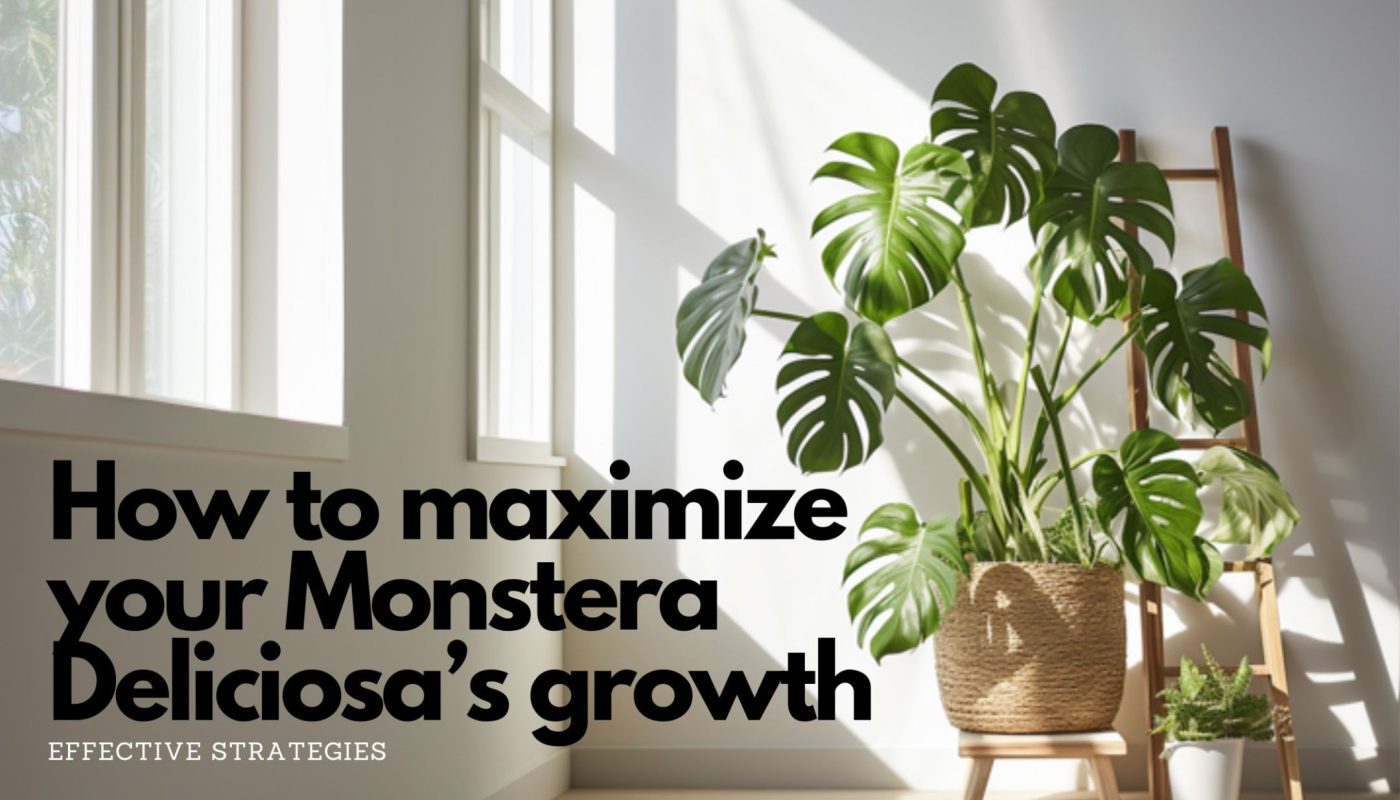Do you want your Monstera Deliciosa to grow larger and look healthier? Let me show you easy methods that can boost your plant’s size and health – from feeding it the right way to using supports that help it stand tall. Find out how to make your Monstera the pride of any plant lover’s collection!
Ready to take your Monstera Deliciosa care to the next level? Click here to download the FREE beginner’s guide, filled with expert tips and tricks to help your Monstera thrive. Get everything you need in one easy-to-follow guide!
Fertilizing Your Monstera Deliciosa
Why Fertilize?
Monsteras need a mix of nutrients to grow big and healthy. Fertilizing adds these essential nutrients back into the soil, which plants use up as they grow. By adding fertilizer, you provide essential nutrients that are vital for various functions within the plant.
- Nitrogen (N): For Monsteras, nitrogen helps promote vigorous leaf growth and the deep green coloration of the foliage.
- Phosphorus (P): For Monsteras, which are prized for their lush foliage, phosphorus helps strengthen the root system, ensuring a sturdy base for large leaves.
- Potassium (K): It helps Monsteras by enhancing water uptake, activating enzymes needed for growth, and supporting the synthesis of proteins. It is particularly important for helping the plant resist diseases and tolerate stress.
- Calcium (Ca): It helps Monsteras develop strong cell walls, which are necessary for healthy growth and structural stability, especially in large leaves.
- Magnesium (Mg): Magnesium is a central component of chlorophyll and is crucial for photosynthesis.
- Micronutrients: Elements like iron, manganese, zinc, copper, molybdenum, and boron are needed in smaller quantities but are equally vital. They play significant roles in various plant processes, including enzyme activation, photosynthesis, and nitrogen fixation.
How Often and When?
During the growing seasons of spring and summer, feed your Monstera with a balanced fertilizer every four weeks to support its rapid growth. In winter, reduce the frequency or switch to a slow-release fertilizer to match the slowed growth rate and reduced nutrient needs.
Which Fertilizers to Use?
- Liquid Fertilizers: Great for providing control over nutrient application, liquid fertilizers are ideal during the active growth phase when nutrients are rapidly depleted.
- Slow-Release Pellets: These are best used during dormant periods, as they gradually release nutrients, ensuring a consistent supply without the risk of over-fertilization.
My Pro Tip: During the active growth periods in spring and summer, I use liquid fertilizer to cater to my Monstera’s increased nutrient needs. However, during the slower winter months, I switch to slow-release pellets to prevent nutrient overload and potential root damage from over-fertilization.
Supporting Your Monstera Deliciosa with the Right Structure
Choosing the Right Support for Monstera Growth
Monstera plants are unique with their sturdy stems that require support as they grow. Unlike typical vines that you might twist around a stake, Monsteras need a stable structure that accommodates their weight and supports their climbing nature. Here are some of the best supports you can use:
- Moss Poles and Coco Poles: These are thick, cylinder-shaped poles that come covered either in sphagnum moss or coconut husk. The rough texture of these coverings mimics the natural tree bark found in a Monstera’s original rainforest habitat, providing an ideal surface for the plant to cling to. Both types of poles help support new and flexible growth, allowing it to climb naturally.
- Redwood Planks: If you are looking for a simple and cost-effective option before possibly upgrading to a moss pole, redwood planks are an excellent choice. Their natural roughness also helps mimic a tree-like surface, encouraging your Monstera to climb and adhere to the plank.
- U-Shaped Bamboo: This support structure is lighter and thinner than a plant pole, making it easier to insert into your plant pot. It resembles a garden stake but offers dual support arms connected at the top, ideal for guiding the growth of your Monstera upwards without the need for heavy handling.
Installing the Support
To install any of these supports, you will likely need to dig a hole near the back edge of the pot. This might mean you have to remove and repot the plant, especially if it is grown large. Ensure the pole or plank is firmly placed and can support the weight and height of your Monstera as it grows.
Securing Your Monstera to the Support
Once your support is in place, use soft plant ties to secure the Monstera’s stems to the pole. Be gentle with stems that extend directly outward, as forcing them to bend upwards may cause them to break. If a stem seems too stiff or is in an awkward position, it might be best to leave it as is or consider propagating it into a new plant.
As new, flexible stems sprout, gently guide them to twist around and cling to the structure. Additional ties might be needed over time as the plant continues to grow and develop new stems.
As your Monstera adapts to its support, keep an eye on how it interacts with the structure. Adjust ties and add support as needed to encourage healthy growth and prevent damage to the plant.
The Importance of Basic Care
Even though this post focuses on special tips for growth, it is very important to keep up with basic care like the right amount of light, water, humidity, and temperature. These are the foundation of a healthy Monstera. To learn all about these basics, check out my blog post about basic care for your Monstera Deliciosa — a great resource for new and experienced plant owners alike.
The Necessity of Repotting
Why Repot?
As your Monstera grows, it will need more space. Repotting gives your plant room to spread its roots, which helps it absorb nutrients better and grow healthier. It also prevents the roots from becoming too tightly packed, which can stunt your plant’s growth.
? Keep an eye out for a detailed guide on how to repot your Monstera, coming soon. This will give you step-by-step instructions to make sure your plant gets the perfect new home it needs to continue growing.
Get More Great Tips
If you found these tips helpful and want to learn more about taking care of your Monstera, download my beginner’s guide to Monstera Deliciosa. This guide will give you all the tools you need to start off right and keep your Monstera thriving. Download your free copy here!
Also check out all the other blog post about the Monstera Deliciosa
Why the Monstera Deliciosa is the Perfect Plant for Every Home.
How to keep your Monstera Deliciosa alive – basic care for your Monstera
Why your Monstera Deliciosa is dying and how to help.
Images
- Thumbnail – Generated with AI (Midjourney)
- Moss Pole –Unsplash
- Feey, Fertilizers – Unsplash, Feey





Thank you for the tips Anja! Very helpful for beginners like me ?